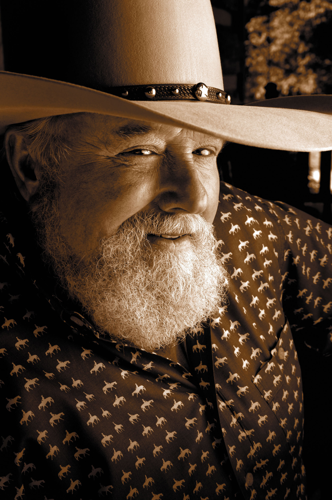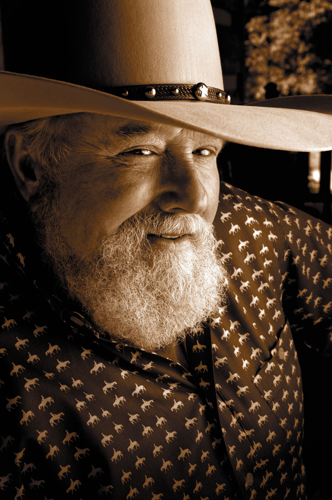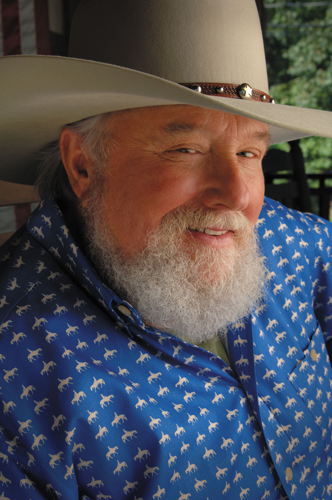
[Editor's Note: We here at the Scene are blessed to work with J.R. Lind, in part because we get to experience — daily — his lengthy Slack screeds expounding his theories on a wide variety of subjects. For example, why The Bellamy Brothers' "Let Your Love Flow" is a Christmas carol, how Dirty Dancing is an allegory about the history of the American left after World War II, and why orderly bison are to blame for our city's transit woes. Rather than keep this bricolage of verisimilitude to ourselves, we've asked him to share some of his declamations with our readers.]
Charlie Daniels had some kickass songs. This will not be disputed.
The fiddler and leader of an eponymous band died Monday. He was 83.
His musical legacy is a good one. I guess you didn't know it, but he was a guitar and bass player, too, and appeared on Bob Dylan's seminal Nashville Skyline and his less seminal Self Portrait and New Morning.
Then he formed the Charlie Daniels Band, cranked out some radio bangers and the rest is history. Well, it's not, because Charlie never shut up.
The man whose first charting song was "Uneasy Rider," a delightful story about a countercultural good ol' boy punking some racist Mississippi doofuses, aged into the man who tweeted that the Illuminati was not a frivolous subject. He directed this tweet to *squints* Taco Bell, thus disproving his assertion.
Who'd've thunk that the man who had to tuck his hair under his hat to go into the Dew Drop Inn and made wisecracks about George Wallace would one day sport a MAGA hat instead?
Viewed in vacuum, there's a lot of difference between 1973 Charlie and 2016 Charlie, but Daniels' journey isn't a terribly unusual one. And it's not just because of the maxim, falsely attributed to Churchill: "If you’re not a liberal when you’re 25, you have no heart. If you’re not a conservative by the time you’re 35, you have no brain." One of the reasons you know Churchill didn't say it is because he was a Conservative when he was 25 and a Liberal when he was 35.
In any case, I once asked Daniels about his transition and he tweeted to me something about how my mom used to change my diapers. Which is true, and, I guess, an earthier version of the fake Churchill quote.
Daniels' move rightward — and it wasn't just a move to the Establishment Right; he became downright reactionary — isn't unique. Baby Boomers and the Silent Generation (Daniels, born in 1936, was a member of the latter) voted overwhelmingly for Trump in 2016 and are generally reliable Republican voters.
Did Daniels just get older and naturally more conservative, or were the hints there all along?

The CDB's two biggest hits — the aforementioned "Uneasy Rider" and "The Devil Went Down to Georgia" — are cut from the same cloth: Mischievous country boy thumbs nose at dastardly power structure. In the former, it's the racist oeuvre of the Deep South; in the latter, it's, well, Satan. Through pluck and/or talent, in both songs, our protagonist wins against the forces of darkness and keeps his soul. These are stories of individuals who aren't going to be bested or told what to do by those they consider evil. The Uneasy Rider would rather kick Old Green-Teeth in the knee that tip his hat (and his hand) to a lady. Johnny, even considering that it might be sin, was going to show the Devil how its done.
Sandwiched between those two big hits, the CDB had more moderate success with "The South's Gonna Do It Again" and "Long Haired Country Boy." Neither were chart monsters, but both are still classic rock radio staples. The former is little more than a litany of Daniels' fellow Southern rockers, the only moderately political message being "be proud you're a rebel, cause the South's gonna do it again." Do what again? A question that even Crow T. Robot and Tom Servo tried to solve.
"Long Haired Country Boy," though, is undoubtedly a political song. Daniels "ain't asking nobody for nothin' " if he can't get it on his own. If you don't like the way he's living, you can leave him alone. This Daniels mostly wants to get stoned in the morning, get drunk in the afternoon and take another toke. This is a proto-libertarian, a hard live-and-let-live guy. Notice, though, he doesn't rail against government assistance, just that he himself doesn't want it. His venom is reserved for the preacher man putting down rock and roll and making money off the gospel. It's hypocrites who deserve his fire.
By 1980, though, something really started to change in Daniels. In 1976, he was still on the left-hand side of the ledger, generally speaking. He endorsed Jimmy Carter in 1976, for example. But four years later, the general post-Watergate malaise of the 1970s was made more acute by the gas crisis, rising inflation and unemployment, and a miserable time in America was made worse by the Iran hostage crisis. Disillusionment gave America Carter, and a promised return of a shining city on a hill gave us Reagan. Daniels, meanwhile, sounded the calls for unity with "In America," saying that despite the current troubles, we'd stick together, the cowboys and the hippies, the rebels and the yanks (he also threatened the Ayatollah and possibly the Red Army with Pittsburgh Steelers fans).
But smattered inside the rather anodyne we're-all-in-this-together reminder are some America First whispers. There's old tropes of American exceptionalism in its original sense ("We're gonna put her feet back / On the path of righteousness and then / God bless America again") and general American swagger, what with the talkin' real loud and walkin' real proud. But mostly, well, it's a fun little rocker that makes you wanna throw your arm over your neighbor and take what comes.
And then, in 1988, Charlie re-worked "Uneasy Rider" into a tune about he and his buddy taking a trip to New Orleans and accidentally ending up in a gay bar. Let's just say the song ain't winning any GLAAD awards.
For the last 30-odd years of his life, it was more of the same for Daniels, railing against Barack Obama, safe spaces, Hillary Clinton, Colin Kaepernick and the rest of the usual bugbears (and Taco Bell for its frivolity vis-à-vis the Illuminati).
I'm not going to try to psychoanalyze Charlie Daniels too much, but, in his mind, he was still the "Long Haired Country Boy," still the "Uneasy Rider." It wasn't him that changed, it was the world. And it's the same for a lot of people his age and a touch younger. To Daniels & Co., they are still the counterculture, it's just that the culture has changed so radically and they couldn't keep up. Sure, a lot of people in Mt. Juliet (and elsewhere) shared Daniels' view of the world, but that wasn't a view being articulated to their satisfaction in mass media. They still want to be left alone, just not necessarily by the same forces and structures they wanted to be left alone by 40 years ago.
There's one undercurrent in every one of Daniels' big hits: pride. And there's nothing wrong with being proud of one's self, proud of where one comes from or being proud of America. Aristotle called pride the crown of virtues. But pride has a dark side, too; in excess, it becomes hubris, the vice of making oneself feel proud through denigration. There's a reason the Desert Fathers and their theological successors put pride first on the list of the deadly sins, casting it as the sin from which all others flow.
It's a lesson that seemingly slipped away from Daniels. The Uneasy Rider of 1973 was, rightly, proud of himself for duping nogoodniks. The Long Haired Country Boy was proud to be self-sufficient. And "In America," Daniels reminded us at a dark time we could rediscover our collective pride together. But the Uneasy Rider of 1988 willfully ignored that other people are allowed to be proud of themselves, too. And tweetin' Charlie forgot that America is a constant journey towards a more perfect union. It's not an easy ride (so to speak) and Lord knows we'll always fall short of perfection, but the answer isn't to treat some arbitrary moment in the past as the endpoint of the journey when America was perfected.
To do so would, after all, be prideful. And, well, we know what pride cometh before.






